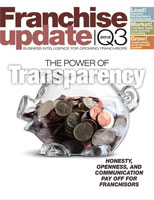California Here We Come?
In what can only be described charitably as a misguided undertaking, an assemblyman in California has decided that one of the few bright economic stars still shining in California--its large, strong, and relatively problem-free franchising economy--needs to be restrained.
According to the IFA, California has 83,000 franchised locations generating $94 billion in economic output and employing 925,000 workers. So it is curious, given the state's depressed economic climate, that anyone in California would think now is a good time to propose a sweeping anti-franchising measure like AB 2305, "The Level Playing Field for Small Businesses Act of 2012."
The proposed bill mandates terms that all franchisors will be required to include in their California contracts and grants new and expansive rights to franchisees, including a perpetual right to use a franchisor's property, the elimination of post-term covenants, and restrictions on a franchisor's right to place locations where customers shop. The bill fails to address the economic harm caused as it strips from franchisors significant personal property rights without any compensation. I am uncertain why anyone would think this is either fair or creates a level playing field, or that it is wise to dramatically limit a franchisor's rights to enforce its standards and by doing so create unintended risks for consumers in California.
What can be driving the assemblyman? It can't be the results of any empirical research showing an endemic problem in California franchising; none exists. It can't be an increase in franchisee litigation or complaints in California either; there are relatively few franchisee complaints and an insignificant number of lawsuits filed against franchisors in California, given the number of franchisees in the state. It certainly can't be that franchising is under-regulated in California. After all, the California Franchise Investment Law (CFIL) and California Franchise Relations Act (CFRA) are some of the strictest franchise disclosure, registration, and relationship laws in the U.S.
So what can it possibly be? It could be that the handful (and it's a relatively small handful) of franchisee advocates who have been pushing for increased relationship laws throughout the U.S. for many years have the assemblyman's ear and have told him about their perception of relationship problems in franchising. Perhaps they forgot to mention that the FTC completed a decade-long review in 2007 and revised the disclosure laws in the U.S. When asked by these same franchisee advocates to establish franchise relationship laws in the U.S., the FTC replied that federal relationship laws were not needed as there was inadequate "evidence to support a finding of prevalent acts or practices that meet each of the three prerequisites for unfairness...." Franchise regulations work quite well in California and in the rest of the U.S. Relationship laws like the one being proposed in California are simply not needed.
Quite possibly the assemblyman may simply not understand the dynamics of franchising. A clue to what he knows and understands might be found in a recent interview he gave. According to the interview, the assemblyman seems to think that most franchisors are large businesses with legions of lawyers. Most franchisors in California are small businesses and, with the exception of the McDonald's of the world, which are not the target of this regulation, franchisors in the U.S. on average have fewer than 100 locations in total. The assemblyman may not fully understand that California's franchisee-centric CFIL and CFRA laws were originally put into place to reduce conflict in the franchise relationship; nor that existing laws already require franchisors to clearly detail the duties and responsibilities of the parties in a California-mandated disclosure document. Of course under both federal and state law, that information is provided to prospective franchisees weeks before they make their investment decision. The franchise regulators in California are widely considered to be some of the most diligent in the U.S., and they review each franchise offerings before franchisors are allowed to register and begin offering franchises in the state.
So many problems...
There are so many problems with this law it's hard to find a place to begin. But clearly the premise of the law (a "Level Playing Field") is mistaken. For the protection of consumers, franchisees, and franchisors, franchising can never--and should never--be a level playing field. As the owners of their intellectual property, franchisors have the right--and under federal law, the obligation--to control how their brand is licensed. Franchisors are required under federal law to control how others use their intellectual property. To meet these requirements, franchisors establish and enforce standards.
- Choice. Another problem with the bill is that its author does not seem to comprehend that an investor can choose from many active and passive investment opportunities, including becoming a franchisee or opening their own, independent business. If investors choose to become franchisees they have the opportunity to select from thousands of franchise opportunities available in California and can make decisions based on the abundance of publicly available information. Some of this information is included in the disclosure document mandated by the state that details each party's rights and obligations. Many choose not to become a franchisee because the terms contained in the franchisor's offerings do not meet their investment requirements; because of the restrictions and obligations required by the franchisor over the use of the franchisor's personal property; or because they have an idea and wish to risk going it alone so down the road they can become franchisors.
- Â Consumers. Certainly Californians will be inconvenienced, as franchisors will be unable under the law to open locations throughout the state. Companies like Starbucks, which are not franchised, are free to place their locations wherever they wish, but that will not be possible for franchisors in California. Even with mandated pre-sale disclosure of the territorial rights granted to franchisees, AB 2305 prevents franchise systems from doing the same thing. This will take away franchisor's ability to establish critical mass in markets in California, which will put them at a competitive disadvantage.
- Economics. The rule does not even make sense economically. Under the law, during its first 12 months, a new location cannot have more than a 6 percent impact on an established franchised location. As franchising is used in more than 120 different industries, many of which do not even have fixed locations, it is unclear how this could even work. The law certainly does not seem to recognize that initial locations usually do extremely well, and that a second location will always have impact on them. For example, if a restaurant system averages $100,000 in sales a month per location and the first franchisee in a market achieves $500,000 in sales, if a second location opens and the combined sales of the two locations remain at $500,000, then under AB 2305 the franchisor can't have two locations. Under this example the market might hold five locations but the franchisor would be limited to only one, since they could not affect the first location by opening a second.
Imagine if AB 2305 were the law in California back to the 1950s. In addition to having only one baseball team and one football team in Los Angeles, you would have only one Marriott hotel, one McDonald's and, if they were a franchisor, only one In-N-Out Burger. Territorial rights granted by a franchisor in California should simply be what is clearly disclosed in the offering documents provided to franchisees, as it is elsewhere. If prospects do not like the terms, they don't have to become franchisees or can choose another franchise offering. - "Competence." AB 2305 also requires that a franchisor must be competent, which sounds so reasonable. But this requirement is unsupported by any empirical studies indicating a problem with franchisor competence today. When Congress looked at this issue a decade ago, they found it was not needed. Besides, competency is not even defined or measurable, and therefore is simply not good public policy. Enactment of this bill will result in massive amounts of litigation, and likely creates such a risk that if may effectively stop all franchising activity in California. Consider that the bill does not answer any of these truly simple questions:
Will there be big franchisor competency standards and small franchisor competency standards, and does the industry matter?
Will the standard be the same for new and mature franchisors? If they are the same, how will a new franchisor meet the same standard as achieved by McDonald's? Would Pinkberry have been allowed to offer franchises in California since it did not have the same competency as Baskin-Robins when they began to franchise?
Will the state accept the CFE designation as an indication of competency? If not the IFA, who will determine if a franchisor is competent? Franchisee advocates? Franchise regulators? The courts? - Â Prohibitions and limitations. This bill also contains prohibitions and limitations on termination, renewal rights, and post-term covenants. Thus, it has the unintended consequence of cutting the benefits franchisees look for in any franchise system and puts franchisees and their equity value at heightened risk from the actions of other franchisees. It takes from franchisors substantial value they have in their personal property and transfers that value to some franchisees, with no compensation. It is a radical departure from how business is conducted in the U.S.
Where are the limits under the law, and how far will California go in dictating the terms of the franchise offering? Will regulators next want to determine the length, curriculum, cost, and who is required to attend initial training? Clearly, training is very important. Will regulators be able to mandate the frequency and scope of franchisor-provided field support visits? Field support is also important. Perhaps the regulators will want to determine fees and mandate a minimum acceptable ROI before a franchise is even offered.
California is an important market and franchisors will continue to expand there, but I suspect they will first look elsewhere for growth and possible limit their California expansion to non-franchised locations. Franchisees will be seriously damaged, as opportunities for investment available in other states may not be available to them in California. The bill puts consumers at a higher risk because of the restrictions on a franchisor's ability to control their own standards, and it will certainly limit their convenience.
Because of these and other problems, I trust that saner heads in California will understand the problems with AB 2305 and, following the scheduled hearing, decide not to advance the measure. Clearly it's time to begin to understand why relationship laws are even contemplated, and for franchising to do a better job of educating elected officials on why they are neither needed nor beneficial. The fact is that relationship laws have not been a positive addition to franchising and franchisees and franchisors have been negatively affected because of them.
Michael Seid is managing director of MSA Worldwide a franchise advisory firm providing guidance to new and established franchisors. Contact him at 860-523-4257 or [email protected].
Share this Feature
Recommended Reading:
FRANCHISE TOPICS
- Multi-Unit Franchising
- Get Started in Franchising
- Franchise Growth
- Franchise Operations
- Open New Units
- Franchise Leadership
- Franchise Marketing
- Technology
- Franchise Law
- Franchise Awards
- Franchise Rankings
- Franchise Trends
- Franchise Development
- Featured Franchise Stories
FEATURED IN

Franchise Update Magazine: Issue 3, 2012






 The franchise legal listed above are not related to or endorsed by Franchise Law News or Franchise Update Media Group. We are not engaged in, supporting, or endorsing any specific franchise, business opportunity, company or individual. No statement in this site is to be construed as a recommendation. We encourage prospective franchise buyers to perform extensive due diligence when considering a franchise opportunity.
The franchise legal listed above are not related to or endorsed by Franchise Law News or Franchise Update Media Group. We are not engaged in, supporting, or endorsing any specific franchise, business opportunity, company or individual. No statement in this site is to be construed as a recommendation. We encourage prospective franchise buyers to perform extensive due diligence when considering a franchise opportunity.